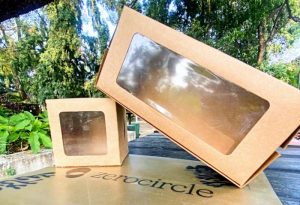ZeroCircle creates marine-safe packaging materials from locally sourced seaweed. Low-energy, green processing technology is employed to create thin films, coatings, and glues that can mitigate the environmental impact of single-use plastic. “Our technology can be plugged into existing plastic production lines with minimal changes in existing commercial production methods,” said Neha Jain, director, ZeroCircle.
Jain adds, “This makes it easier for businesses to transition to carbon efficiency across any geographic location without affecting existing jobs. Eventually, Zerocircle aspires to make large industries pollution free and replace everyday items in your daily life with carbon-efficient, 100% home compostable, and food-contact-safe materials that come with an expiry date, unlike plastics.”
As Packaging South Asia reported earlier, the Marico Innovation Foundation (MIF) collaborated with the Indian Institute of Science (IISc) and Praxis Global Alliance as knowledge partners to develop the innovation playbook. The partners assisted in identifying the challenges created by plastic waste at the macro and commercial levels as well as outlining opportunities and recommendations in the plastic waste management space while dispelling myths, especially on bioplastics. The research methodology consisted of an in-depth assessment with corporate leaders, start-up ecosystem players, industry experts, and scientists.
The playbook features 15 innovations that address plastic waste with their solutions. The report lists models of communities and cities that have addressed the plastic waste challenge through a host of innovative, sort-at-source, collection, and recycling initiatives. Neha Jain was one of the seven innovators recognized at the recent MIF event in New Delhi.

A Google alumna, Neha Jain is a techpreneur and a marketer with over 15 years of experience who spent years introducing digital concepts to organizations in telecom, retail, and aviation. Following her corporate stint, she worked with multiple businesses only to discover that the issues impacting climate change and plastic pollution couldn’t be solved by better engineering and conscious consumer choices alone.
The resources had to be regenerative, scalable, and socially inclusive. Her search for a waste-free living brought her to the coasts of Maharashtra. An ocean is the biggest opportunity and within the ocean grows seaweed – with this thought, ZeroCircle was born. Neha decided to harness this powerhouse crop to make the building blocks of tomorrow including futuristic packaging materials.











